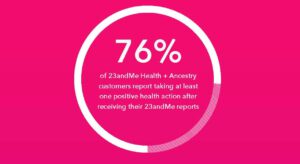Every year, millions of us make New Year’s resolutions to improve our health. We pledge to eat better, go to bed earlier, or exercise more. And every year, most of us don’t follow through and make those healthy behavior changes. Typically, we’re giving up on our resolutions right about now.
We start with great intentions, but most of us soon abandon them by the middle of February, according to the U.S. News & World Report. It’s not because we don’t want to change. Many of us simply don’t know how to stick to it.
But what if we didn’t quit? What if we found a way to make resolutions around our health that we could stick to?
Small Changes with Big Health Results
A recent study revealed that a few simple changes to eating habits in the United States could save more than $50 billion yearly in treatment costs for cardiovascular disease and diabetes. If a mere 1 percent of smokers on Medicaid quit smoking, it’d save the program $2.6 billion each year, according to research by UCSF. If half of those smokers quit, annual savings would jump to $130 billion.
The lives saved by that kind of change are much more important than the money.
So how do we do it? How do we make clear, concrete and achievable health resolutions and stick to them?
Factors for Successful Healthy Behavior Change
From experience, most of us know what doesn’t work: we usually fail on resolutions that are too broad and impersonal or if we make resolutions that are too far beyond what is immediately possible. Intentions are important, but to make changes to improve our health, we need to set clear, precise, and achievable resolutions and find tools to help us get there.
At 23andMe, we’ve been studying genes and genetic variants associated with various health conditions and the actions people can take to improve their health. We’re seeing that learning about your genetics when combined with informed action, makes a potent recipe for positive change.
For the last four years, researchers at 23andMe have been looking at data around New Year’s Resolutions that are focused on improving one’s health. This work has informed some of what we’ve learned about how your age, where you live, and your genetics may influence whether you make resolutions and follow through with them. This yearly study has raised many new questions, not just about who makes and keeps resolutions but about what helps them actually reach their health goals.
More Data Needed
We want to know more, so we’re also looking at other data about healthy behavior change. We want to know whether some customers are already primed and ready to take action or whether there is something about our personalized health reports that nudges them toward healthier behaviors. We have some data indicating that it may, but we need to learn more.
This is important because influencing positive healthy behavior could have a big impact on public health. In the United States, we’re very good at monetizing illness, but not so good at prevention. We know a lot about developing drugs and marketing treatments for chronic conditions like Type 2 Diabetes and cardiovascular disease, but we haven’t figured out how to help people take actions that could stop them from developing in those conditions in the first place.
By 2030, the CDC predicts, the annual cost of cardiovascular disease in the US, in health care expenses and lost productivity, will exceed $1 trillion. Projections suggest that by 2030 half the U.S. population will be obese. The associated health impacts will be devastating. And yet, we know this is preventable with simple lifestyle changes.
The challenge is how to help people make lasting changes to improve their health.